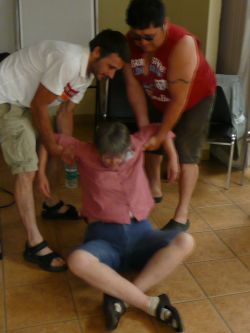Halifax Media Co-op
News from Nova Scotia's Grassroots
A Week of Civil Disobedience Trainings in Elsipogtog
Thirty people have been arrested in Kent County, New Brunswick this summer for resisting shale gas exploration in the region. After a week of civil disobedience trainings, there's likely to be dozens, if not hundreds more.
On Tuesday, over 50 people (including me) gathered at the Elsipogtog Fisheries Centre in Kent County. We learned about non-violent direct action, practiced going limp when being arrested, strategized for effective protests, and talked about colonialism and treaty rights.
Participants were of all ages, both Native and non-Native, although the majority appeared to be white.
I asked Eliza Knockwood, a young mother from Abegweit First Nation in PEI, who has family in Elsipogtog and has been involved in the Sacred Fire encampment since early June, what she thought of the mix of people taking part in the trainings.
"We all have a common thread today. It's not just about being a black person or a Native person or white person," said Knockwood. "Today we are a people that are standing for a unified message. We are asserting our human rights and our treaty rights…We as a peoples stand firm on Mother Earth to hold our ground, to hold our water sacred. And each other."
There was a sense of something significant happening, as Mi'kmaq warriors, Acadian grandmothers, and young people on summer holidays sat down and shared a potluck of bacon, watermelon, cornbread, and couscous.
But of course, it wasn't that simple. Barbara Low, a Mi'kmaq woman named the "elephant in the room" on Tuesday afternoon when she brought up the different realities people were bringing to the table. She spoke about how Native people are criminalized and treated differently by police. She spoke about how the battle against fracking might simply be about the environment for white people, but for First Nations, it is about home, land and colonialism.
It seemed like this was a message that non-Natives present were starting to understand.
Sue Adams is part of anti-fracking organizing in her own community of Antigonish, Nova Scotia. Resistance to shale gas exploration has not been the primary reason for her visits (this was her third) to Elsipogtog and the Sacred Fire, however.
"My main concern here at this time is First Nation treaty rights," said Adams. "The right to free, prior and informed consent. Some of my friends here feel like that hasn't been respected."
Philippe Duhamel travelled from his home in Quebec to facilitate the trainings. He has been involved in movements for social and environmental justice for decades and arrested more times than he can count.
He believes there's something special happening around the Sacred Fire in Elsipogtog.
"What's especially interesting is the coming together of the Maliseet, Mi'kmaq, the Acadians and the Anglophone New Brunswickers," says Duhamel. "To stand their ground against the destruction of millions of gallons of water and the fracking of wells, that we know now poison whole communities."
Duhamel says he's never seen a community organize so quickly or so effectively.
"I know it's difficult. I know we're riddled with conflict," he says. "It's very hard work. But I see the promise here of developing a model to work interculturally to build a people's movement to stop the land grab."
"People here have a good chance of creating a model victory," says Duhamel. "By a model, I really mean something that can be replicated everywhere. What are the ingredients of [effective] mass civil disobedience?"
Willie Nolan is hoping to find out. Nolan lives in Kent County and has been working against shale gas in New Brunswick for over four years. She's been involved at the Sacred Fire since June 3, and is hoping her community is at a turning point.
"I'm hoping we'll be able to collaborate and implement strategies that will force the industry to get out of here," says Nolan.
But to do that, "We need more numbers," she says. "We will win, [but] we'll win quicker the more people who are ready to jump on board and help."
There is an open, non-violent direct action training at the Elsipogtog Fisheries Training Development Centre on Saturday. To register, email aboriginalrights.atlantic@gmail.com with “REGISTER” in the subject line. Include your name, contact information, and that you would like to attend Saturday's training.
The site for the Halifax local of The Media Co-op has been archived and will no longer be updated. Please visit the main Media Co-op website to learn more about the organization.



